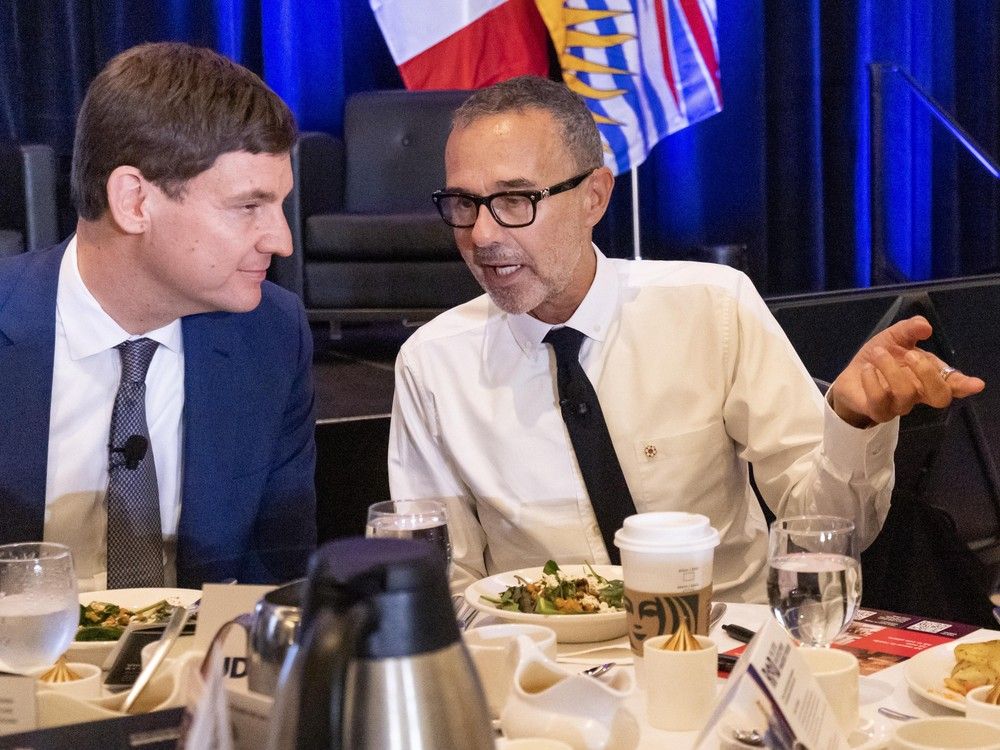
Vancouver’s “condo king,” Bob Rennie, wants the province to appoint a “real estate czar” to cut through red tape to help B.C.’s struggling development industry, which is facing a sales slowdown, stalled projects and accumulating unsold stock.
At a sold-out Urban Development Institute event with Premier David Eby on Friday, Rennie praised the appointment of Larry Campbell as provincial point person for the Downtown Eastside and said the floundering development and real estate industry could use a similar boss.
“We need an ombudsman, we need a czar of real estate that could relax things. Like, why do towers have to be 80 feet apart, why not 74 feet apart?” said Rennie. “Why, if it identifies voids in the market (or can offer affordable rents), can’t we build 10 storeys instead of six storeys?”
Rennie said a real estate czar would allow for some “elasticity” and “flexibility” instead of “prescriptive” policies.
“We need some interference,” he told the premier. “We need to unlock these log jams.”
It often takes longer to obtain necessary permits and approvals than it takes to build a building, Rennie told Postmedia after the event.
“We have to have somebody that says the buck stops here. That’s what Larry Campbell is going to do as czar in the Downtown Eastside, work with three levels of government and advocacy groups — if I could see the same thing for housing,” he said.
According to recent StatCan data, B.C.’s construction industry bore the brunt of job losses in the province, losing 7,600 jobs in July .
Some development companies have laid off employees and cancelled projects.
Rennie’s condo marketing firm had recently laid off a quarter of its head office staff , citing an uncertain real estate market.
UDI president Anne McMullin described the current climate as the most challenging for the development industry in three decades.
“What we were looking for is for the premier to understand the difficulty this industry is in right now, to understand that work is grinding to a halt and there’s massive structural issues within our industry that needs government attention.”
People might see cranes at construction sites now, but those are projects sold and approved two to three years ago, she said. There’s very few multi-family projects launching, which means there’ll be very few homes being built a year or two from now.
The Canada Mortgage and Housing Corporation estimated there will be 2,500 unsold condos in Metro Vancouver by the end of the year. The UDI believes that number is closer to 3,500.
“The costs have escalated to a point that it costs more to build than what people can afford to buy.”
McMullin said the price escalation is due to higher costs of labour, materials and borrowing, but “ a huge part of it is government fees, charges and delays” as well as green policies and “nice-to-have” building code requirements that add to the cost of building housing.
Eby was noncommittal about Rennie’s call for a real estate czar, saying there is a minister of housing committed to working with the industry.
He also noted he was sitting there with Rennie in front of the development industry.
“I don’t think you can do better than access to the premier in terms of priority for the industry, and I’m telling you explicitly there is an opportunity for us to be more lined up.”
Eby said the province has made changes to help the industry, including changing how development cost charges are paid and extending the early purchase period for large presale projects.
But said, “I’ll take your point, Bob, that there’s more for us to do.”